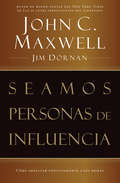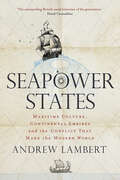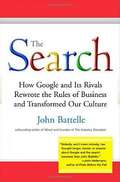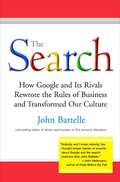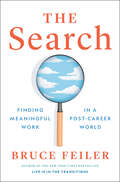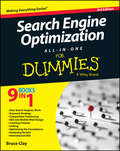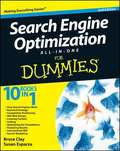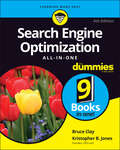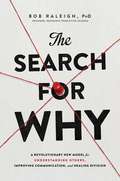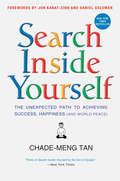- Table View
- List View
Seaman's Guide to Human Factors, Leadership, and Personnel Management
by Jose Rodriguez CordonTraining and certification for Seafarers has been founded on technical aspects, but maybe the most important thing to do aboard a ship is dealing with people. This book, written with seamen in mind, covers areas of expertise that every officer should know to improve motivation, engagement, teamwork, and conflict handling; in short, to be a leader. This book also covers the new requirements for every officer or merchant marine and can be used in courses on this topic. It focuses on seafarers' needs and the language used, avoiding the excessive use of psychological terms, yet keeping the accuracy. Features Covers new requirements for every Merchant Marine Officer Written for and by a seaman, with the accuracy of a psychologist Presents knowledge on how to improve motivation, engagement, teamwork, and conflict handling Includes how to manage people in emergency situations and avoid the loss of lives, like the disaster of Costa Concordia and Estonia
Seamless: A Hero's Journey of Digital Disruption, Adaptation and Human Transformation
by Anders Sorman-NilssonAchieve brand success with smarter change management and seamless transformation Seamless is a guide for transforming your brand and heroically taking your business into the future. Customers are sick and tired of the inconvenience, friction, arrogance and grating seams they experience on their customer journeys caused by brands undergoing awkward and haphazard change. This book shows you how to remove the external and internal seams for a smooth transition between marketing channels, to provide a transformative customer journey. Anders Sörman-Nilsson, futurist and author of Digilogue (Wiley 2013), reveals the key factors to designing a cohesive and agile brand that is fit for the future. This book looks at on-the-ground implementation of Digilogue ideas, giving you a first-hand account of how emerging technology has evolved and disrupted the business landscape since 2013. You'll learn the trials and tribulations of omnichannel marketing, change leadership, start up thinking versus a heritage (and family) business legacy and why there has never been a better time to implement seamless technologies in your business. The future doesn't unfold neatly — in fact, it's often a disruptive slap in the face. Seamless is the key to a successful business future, and this book shows you how to make seamlessness work for your company, starting today. Design away the friction with transformative customer experiences Weave disparate channels and parts of a brand together into a seamless whole Take an integrative, rather than additive, approach to communications Achieve the highest level of customer intimacy, the key to customer loyalty Drive seamless change inside your organisation by designing journeys of constant adaptation Communication channels continue to proliferate, and simply adding every new flash in the pan is a sure path to ruin. You need to bring together every part of your brand into a cohesive whole, one with deliberate, strategic structure and wholeheartedly gather all your stakeholders around it. Seamless shows you how to remove the scar tissue, reveal your brand's fresh edge and meet the future curious, agile and open-minded.
A Seamless Argument: Real World Strategies for Syndicating Recommendations, Understanding Managers' Motives, and Preparing an Organization for Change
by Patricia Gorman Clifford Jay Barney"What I Didn't Learn in Business School" is a fictional account that follows new consultant Justin Campbell as he joins an elite consulting team hired by a chemical firm to assess the potential of a newly developed technology. Collecting data, analyzing information, and developing a strategy are core components of Justin's job. The most important part, however, is selling his ideas. Unfortunately, and especially for recent business school graduates, that is a very difficult skill to learn. In this chapter, follow Justin and his team as they prepare to sell their carefully tested strategic recommendations to their client. As they craft their presentation, they must anticipate the motivations and potential objections of the firm's managers, develop strategies for gaining buy-in, and lay the groundwork for change. This chapter was originally published as Chapter 13 of "What I Didn't Learn in Business School: How Strategy Works in the Real World."
Seamos personas de influencia
by John C. MaxwellCon influencia, usted puede lograr el éxito en el hogar, el trabajo, y en toda área de la vida.Cualquiera que sea su vocación o aspiración, usted puede aumentar el impacto que tiene sobre los demás al convertirse en una persona de influencia. Ya sea que desse crear un negocio, fortalecer a sus hijos, o alcanzar al mundo, usted puede lograrlo elevando su nivel de influencia en la vida de los demás.
Seaports and Development: The Experience of Kenya and Tanzania (Routledge Library Editions: Development #69)
by B. S. HoyleThis book, originally published in 1983, demonstrates the importance of seaports in the growth of less-developed countries. The author focuses on the character of port activity within the context of transport systems and regional economic planning. General principles of port development are illustrated by detailed reference to one Third World port group, that of the Indian Ocean coasts of Kenya and Tanzania. The objective is not merely to illustrate the character of one specific group of ports, but to demonstrate methods of analysis and to underline the crucial role of ports in the development process.
Seapower States: Maritime Culture, Continental Empires and the Conflict That Made the Modern World
by Andrew Lambert“A fascinating geopolitical chronicle . . . A superb survey of the perennial opportunities and risks in what Herman Melville called ‘the watery part of the world.’” —The Wall Street JournalIn this volume, one of the most eminent historians of our age investigates the extraordinary success of five small maritime states. Andrew Lambert, author of The Challenge: Britain Against America in the Naval War of 1812—winner of the prestigious Anderson Medal—turns his attention to Athens, Carthage, Venice, the Dutch Republic, and Britain, examining how their identities as “seapowers” informed their actions and enabled them to achieve success disproportionate to their size.Lambert demonstrates how creating maritime identities made these states more dynamic, open, and inclusive than their lumbering continental rivals. Only when they forgot this aspect of their identity did these nations begin to decline. Recognizing that the United States and China are modern naval powers—rather than seapowers—is essential to understanding current affairs, as well as the long-term trends in world history. This volume is a highly original “big think” analysis of five states whose success—and eventual failure—is a subject of enduring interest, by a scholar at the top of his game.“An intriguing series of stories of communities thinking seriously about how to stand their own ground when outpowered, how to do so in ways that are consistent with their values, and sometimes how to negotiate the descent from being a great power when the cards just aren’t in their favor any more. These are timely questions.” —Times Higher Education Supplement“Lambert is, without a doubt, the most insightful naval historian writing today.” —The Times
The Search
by John BattelleWhat does the world want? According to John Battelle, a company that answers that question--in all its shades of meaning--can unlock the most intractable riddles of business and arguably of human culture itself. And for the past few years, that's exactly what Google has been doing.But The Search offers much more than the inside story of Google's triumph. It's a big-picture book about the past, present, and future of search technology and the enormous impact it's starting to have on marketing, media, pop culture, dating, job hunting, international law, civil liberties, and just about every other sphere of human interest.
The Search: How Google and Its Rivals Rewrote the Rules
by John Battelle"A must-read for anyone endeavoring to understand one of the most important trends of this generation: organizing the world's information and making it universally accessible." - Mary Meeker
The Search
by John BattelleWhat does the world want? According to John Battelle, a company that answers that question—in all its shades of meaning—can unlock the most intractable riddles of business and arguably of human culture itself. And for the past few years, that’s exactly what Google has been doing. But The Search offers much more than the inside story of Google’s triumph. It’s a big-picture book about the past, present, and future of search technology and the enormous impact it’s starting to have on marketing, media, pop culture, dating, job hunting, international law, civil liberties, and just about every other sphere of human interest. .
The Search: Finding Meaningful Work in a Post-Career World
by Bruce FeilerFind work you love. On your own terms. From the New York Times bestselling author of Life Is in the Transitions comes a bold new road map for finding meaning and purpose in what you do, based on insights drawn from hundreds of life stories of Americans of all backgrounds. America is at a once-in-a-generation turning point around work: unprecedented numbers are quitting their jobs, rethinking their routines, breaking away from stifling expectations. The most suffocating iron cage of all is the idea that each of us must follow a linear career—lock into a dream early, always climb higher, never stop until you reach the top. Few ideas have squandered more human potential. Employing his signature, immersive approach, Bruce Feiler is known for taking complex challenges and converting them into actionable steps that can help each of us live with more fulfillment and joy. From thousands of hours of interviews, Feiler has distilled a powerful new vision of work: The people who are happiest don&’t chase someone else&’s dreams; they chase their own. Freed from outdated scripts, they identify what brings them meaning and write their own story of success. The Search introduces an all-new toolkit for achieving that goal, 21 Questions to Find Work You Love. Practical and empowering, these questions will help you unearth the story of work you&’ve been trying to tell your whole life—then go achieve it. You&’ll discover: · The upsides and downsides of work you learned from your parents; · Why your childhood role model offers the best clue to what you should do now; · Who is your waymaker; · When to leave a job and when to stay; · What is your purpose right now; …and much more. From a master storyteller who&’s helped millions transform their lives for better, The Search arrives as the world reimagines the basic assumptions of work and offers a timely, urgent playbook for each of us to get the happiness we seek, the meaning we crave, and the success we deserve.
Search: How the Data Explosion Makes Us Smarter
by Stefan WeitzSearch is as old as language. There has always been a need for one to find something in the jumble of human creation. The first web was nothing more than passing verbal histories down the generations so others could find and remember how not to get eaten; the first search used the power of written language to build simple indexes in printed books, leading to the Dewey Decimal system and reverse indices in more modern times. Then digital happened. Besides having profound societal impacts, it also made the act of searching almost impossibly complex for both engines and searchers. Information isn't just words; it is pictures, videos, thoughts tagged with geocode data, routes, physical world data, and, increasingly, the machines themselves reporting their condition and listening to others. Search: How the Data Explosion Makes Us Smarter holds up a mirror to our time to see if search can keep up. Author Stefan Weitz, Director of Search for Bing (Microsoft), explores the idea of access to help readers understand how we are inventing new ways to access data through devices in more places and with more capabilities. We are at the cusp of imbuing our generation with superpowers, but only if we fundamentally rethink what search is, how people can use it, and what we should demand of it.
Search: How the Data Explosion Makes Us Smarter (Greenhouse Collection)
by Stefan WeitzSearch is as old as language. We've always needed to find something in the jumble of human creation. The first web was nothing more than passing verbal histories down the generations so others could find and remember how not to get eaten; the first search used the power of written language to build simple indexes in printed books, leading to the Dewey Decimal system and reverse indices in more modern times. Then digital happened. Besides having profound societal impacts, it also made the act of searching almost impossibly complex for both engines and searchers. Information isn't just words; it is pictures, videos, thoughts tagged with geocode data, routes, physical world data, and, increasingly, the machines themselves reporting their condition and listening to others'. Search: How the Data Explosion Makes Us Smarter holds up a mirror to our time to see if search can keep up. Author Stefan Weitz explores the idea of access to help readers understand how we are inventing new ways to search and access data through devices in more places and with more capabilities. We are at the cusp of imbuing our generation with superpowers, but only if we fundamentally rethink what search is, how people can use it, and what we should demand of it. "Search: How The Data Explosion Makes Us Smarter" is the first title from GreenHouse Collection. Created by the founders of Insight Labs, the world's first philanthropic think tank, GreenHouse Collection features books that encourage deeper exploration and inquiry to inform new models for social good.
Search and Foraging: Individual Motion and Swarm Dynamics
by Eugene Kagan Irad Ben-GalSince the start of modern computing, the studies of living organisms have inspired the progress in developing computers and intelligent machines. In particular, the methods of search and foraging are the benchmark problems for robotics and multi-agent systems. The highly developed theory of search and screening involves optimal search plans that ar
Search Engine Optimization All-in-One For Dummies
by Bruce ClayThe most comprehensive coverage of search engine optimization In Search Engine Optimization All-in-One For Dummies, 3rd Edition, Bruce Clay--whose search engine consultancy predates Google--shares everything you need to know about SEO. In minibooks that cover the entire topic, you'll discover how search engines work, how to apply effective keyword strategies, ways to use SEO to position yourself competitively, the latest on international SEO practices, and more. If SEO makes your head spin, this no-nonsense guide makes it easier. You'll get the lowdown on how to use search engine optimization to improve the quality and volume of traffic on your website via search engine results. Cutting through technical jargon, it gets you up to speed quickly on how to use SEO to get your website in the top of the rankings, target different kinds of searches, and win more industry-specific vertical search engine results! Includes new and updated material, featuring the latest on Bing!, Google instant search, image search, and much more Covers SEO and optimizing servers for SEO Provides important information on SEO web design Shows you how to use SEO to stay "above the fold" If you're a website owner, developer, marketer, or SEO consultant, Search Engine Optimization All-in-One For Dummies, Third Edition is the only resource you need to beat the competition.
Search Engine Optimization All-in-One For Dummies
by Bruce Clay Susan EsparzaTen minibooks cover all you need to know about search engine optimization Search engine optimization (SEO) is an essential tool for getting a handle on web site promotional tactics and tools. With this complete reference, you'll explore issues not covered anywhere else, including international SEO, how to optimize servers for SEO, and much more. Ten separate books join forces to provide you with a comprehensive, straightforward guide to the benefits, details, and tricks of SEO. Coverage devotes time to topics such as keyword strategy, competitive positioning, SEO web design, search marketing, and more. You'll also look at how search engines work and how to create content, link, optimize the foundations, and analyze results. Details the capabilities and benefits of search engine optimization (SEO) for gauging the success of online promotional tactics and tools Explains how search engines work, nuances of keyword strategy, how to deal with competitive positioning, and more Walks you through working with SEO web design, creating content, linking, optimizing the foundations, and analyzing results Touches on topics not covered anywhere else, including international SEO and optimizing servers for SEO Search no further! This book is one-stop shopping for everything you need in order to start your engine and embrace the potential of SEO today.
Search Engine Optimization All-in-One For Dummies
by Bruce Clay Kristopher B. JonesGet search engines to rank your site as the No. 1 result with help from this comprehensive resource What's the best hiding place in the world? The second page of Google's search results! If you want your website to be found, you need to make sure it appears prominently on search engines. In Search Engine Optimization All-in-One For Dummies, you'll find practical and easy-to-follow advice to increase your site's chances of landing that coveted No. 1 spot on Google, Bing, and other popular search engines. You'll discover how search engines decide which websites to rank highly, how to optimize your site for your best chance at the first page of organic results, what keywords to target, and even how to make your site internationally visible. You'll also find out how to: Optimize your webpage with responsive design that makes it irresistible to Google Create a keyword strategy that keeps interested and engaged visitors flowing to your website Generate the backlinks that will teach Google you're a trusted resource and help you climb the search engine results page Perfect for webmasters, bloggers, e-commerce professionals, and anyone else looking for more online visibility, Search Engine Optimization All-in-One For Dummies is a must-have guide to improving the quantity and quality of your web traffic.
The Search for a Unified Korea
by Eui-Gak HwangWith the leadership of the North Korean political regime in flux, the political and economic relationship between North Korea and South Korea, and between the Korean peninsula and the world, is uncertain. What would be the implications if the current North Korean government were to fall? This timely book provides a thorough analysis of the complexities of regime change that goes far beyond the usual media discussion of this topic. The book traces the historical roots of the existence of the two Koreas and their ideological divide. It goes on to review the consequences of South Korea's alternating policies of "sternness and sunshine" toward North Korea since World War II, and presents an analysis of their likely relative efficacy in achieving re-unification. The book then examines the effect of international affairs on the prospects for stability and reunification on the Korean peninsula and assesses the relevance of reunification experiences in Germany and Vietnam to Korea's situation. Finally, it suggests how to proceed if the opportunity for reunification arises, tackling the issue of how South Korea can respond to other nations' interests in the outcome on the Korean Peninsula and the need for a multinational body to supervise a North Korean transition replacing the present regime. This comprehensive book will be invaluable to any researcher, student, or decision maker interested in the future of the Korean peninsula, East Asian political economy, and international diplomacy.
A Search for Competitive Advantage: Case Studies in Industrial History (Routledge Focus on Industrial History)
by John F. Wilson; Steven Toms; Ian JonesThis shortform book presents key peer-reviewed research selected by expert series editors and contextualised by new analysis from each author on how British industrial firms achieved a competitive advantage. With contributions on industrial cartelisation, organisational structure, the quality of British management, marketing and trade marks, labour relations, and technological innovation, this volume provides an array of fascinating insights into industrial history. Of interest to business and economic historians, this shortform book also provides analysis and illustrative case-studies that will be valuable reading across the social sciences.
The Search for Entrepreneurship: Finding More Questions Than Answers (Routledge Focus on Business and Management)
by Simon BridgeSince the 1980s, governments have often sought to encourage entrepreneurship on the assumption that it creates small businesses which are the primary drivers of job creation. Largely because of this assumption, entrepreneurship has become a valid subject for academic research attracting extensive funding. Yet despite this explosion of scholarship, there is no accepted model of how entrepreneurship operates or even a commonly accepted definition of what it is. Simon Bridge posits that this is because entrepreneurship has been studied as if it were a deterministic science, based on the false assumption that it exists as a specific discrete identifiable phenomenon operating in accordance with consistent, predictable ‘rules’. This challenging book contends that this misdirected search has produced more questions than answers. Accepting that entrepreneurship as we have conceived it does not exist could lead to new and valuable insights into what the different forms of entrepreneurship are and how they might be influenced. Scholars, advanced students and policy makers will find this a thought-provoking insight into the myths and misconceptions of ‘entrepreneurship’.
The Search for Ethics in Leadership, Business, and Beyond (Issues in Business Ethics #50)
by Joanne B. CiullaThis book brings together a wide range of topics in leadership ethics and business ethics. It approaches these topics from the perspective of the humanities as well as the social sciences. About half of the book is on leadership and the other half on topics in business ethics. Besides these general areas of research, the book explores how to teach and study ethics in both business ethics and leadership studies. Specifically, it examines issues ranging from the nature of ethical leadership, to studies of authenticity, virtue, and the public and private morality of leaders. In business ethics, the subjects covered span from moral imagination, to casuistry, meaningful work, and workplace ethics. The book includes a section on the importance of liberal arts for studying and teaching ethics in business and professional schools. It concludes with a reflection on the ethical challenges of leaders and followers in a world where some leaders have inverted moral values.
Search for the Ultimate Energy Source
by Stephen O. DeanWhy has the clean, limitless energy promised by fusion always seemed just out of reach? Search for the Ultimate Energy Source: A History of the U.S. Fusion Energy Program, explains the fundamentals and concepts behind fusion power, and traces the development of fusion historically by decade--covering its history as dictated by US government policies, its major successes, and its prognosis for the future. The reader will gain an understanding of how the development of fusion has been shaped by changing government priorities as well as other hurdles currently facing realization of fusion power. Advance Praise for Search for the Ultimate Energy Source: "Dr. Dean has been uniquely involved in world fusion research for decades and, in this book, describes the complicated realities like few others possibly could." -Robert L. Hirsch, a former director of the US fusion program, an Assistant Administrator of the US Energy Research and Development Administration (ERDA); an executive at Exxon, Arco, and the Electric Power Research Institute (EPRI); and lead author of the book The Impending World Energy Mess (Apogee Prime Books, 2009). "In this book, Dr. Dean provides the many reasons why fusion has progressed more slowly than many had hoped. Budget is usually cited as the culprit, but policy is equally to blame. Facilities have been closed down before their jobs were done--or in some cases, even started. It seems this situation has become endemic in fusion, and if one thinks about it, in other nationally important Science and Technology initiatives as well." -William R. Ellis, a former scientist at Los Alamos National Laboratory, Associate Director of Research at the US Naval Research Laboratory, a vice president at Ebasco Services and at Raytheon, and chair of the US ITER Industry Council and the US ITER Industrial Consortium.
The Search for the Virtuous Corporation: Wicked Problem or New Direction for Organization Theory? (Elements in Organization Theory)
by Justin O'BrienThe corporation is the most complex, adaptive, and resilient model of organizing economic activity in history. In an era of globalization, the transnational corporation has significant power over society. While its rights are specified through private ordering, and choice of jurisdictional home, in the event of conflict of laws, the corporation's duties and responsibilities remain contested. Notwithstanding the argument in institutional economics that all transactions take place within governance and legal frameworks, underpinned by a 'non-calculative social contract,' the terms are notoriously difficult to define or enforce. They are made more so if regulatory dynamics preclude litigation to a judicial conclusion. This Element situates the corporation – its culture, governance, responsibility, and accountability – within a broader discourse of duty. In doing so, it addresses the problem of the corporation for society and the corporation's problem in aligning its governance to changing community expectations of obligation.
The Search for Why: A Revolutionary New Model for Understanding Others, Improving Communication, and Healing Division
by Bob RaleighA groundbreaking new behavioral model that explains what drives us, and why.From tireless marketers to pandering politicians, the forces of modernity have lulled us into lazy categorizations of people, erasing the natural nuances of being human. We are all now accustomed to being reduced to a demographic—man, woman, black, white, old, young. But while these factors may inform our lived experience, what if there is something more fundamentally important that determines our behavior? Bob Raleigh, founder of PathSight Predictive Science, argues that biological instincts are the most foundational determinants of our behavior. PathSight has pioneered a new model that draws on the latest findings in neuroscience, data science, and behavioral science to classify people in five distinct groups, depending on what they instinctively care about most: nurturing, fairness, loyalty, authority, or purity. Their data, drawn from large-scale studies with over 50,000 participants, show that people who share the same instinctual patterns will engage the world in extremely predictable ways, regardless of age, gender, ethnicity, lifestyle, income, and education. Knowing the impact that instinct has on behavior has all kinds of advantages. You can tailor any communication to make it maximally effective for a particular audience. You can strive to empathize with a person you&’ve always found mystifying. And of course, understanding what truly makes you tick is an invaluable step on your journey to self-discovery. In The Search for Why, Bob Raleigh offers the missing link that all the big data in the world can&’t deliver.
Search in the Labor Market under Imperfectly Insurable Income Risk
by Mauro RocaA report from the International Monetary Fund.
Search Inside Yourself: The Unexpected Path to Achieving Success, Happiness (and World Peace)
by Daniel Goleman Jon Kabat-Zinn Chade-Meng TanFor the benefits of meditation to become widely accessible to humanity, it cannot just be the domain of bald people in funny robes living in mountains, or small groups of New Age folks in San Francisco. Meditation needs to become "real." It needs to align with the lives and interests of real people.--from Search Inside YourselfEarly Google engineer and personal growth pioneer Chade-Meng Tan first designed Search Inside Yourself as a popular course at Google intended to transform the work and lives of the best and brightest behind one of the most innovative, successful, and profitable businesses in the world . . . and now it can do the same for you. Meng has distilled emotional intelligence into a set of practical and proven tools and skills that anyone can learn and develop. Created in collaboration with a Zen master, a CEO, a Stanford University scientist, and Daniel Goleman (the guy who literally wrote the book on emotional intelligence), this program is grounded in science and expressed in a way that even a skeptical, compulsively pragmatic, engineering-oriented brain like Meng's can process. Whether your intention is to reduce stress and increase well-being, heighten focus and creativity, become more optimistic and resilient, build fulfilling relationships, or just be successful, the skills provided by Search Inside Yourself will prove invaluable for you. This is your guide to enhancing productivity and creativity, finding meaning and fulfillment in your work and life, and experiencing profound peace, compassion, and happiness while doing so. Search Inside Yourself reveals how to calm your mind on demand and return it to a natural state of happiness, deepen self-awareness in a way that fosters self-confidence, harness empathy and compassion into outstanding leadership, and build highly productive collaborations based on trust and transparent communication. In other words, Search Inside Yourself shows you how to grow inner joy while succeeding at your work. Meng writes: "Some people buy books that teach them to be liked; others buy books that teach them to be successful. This book teaches you both. You are so lucky."



